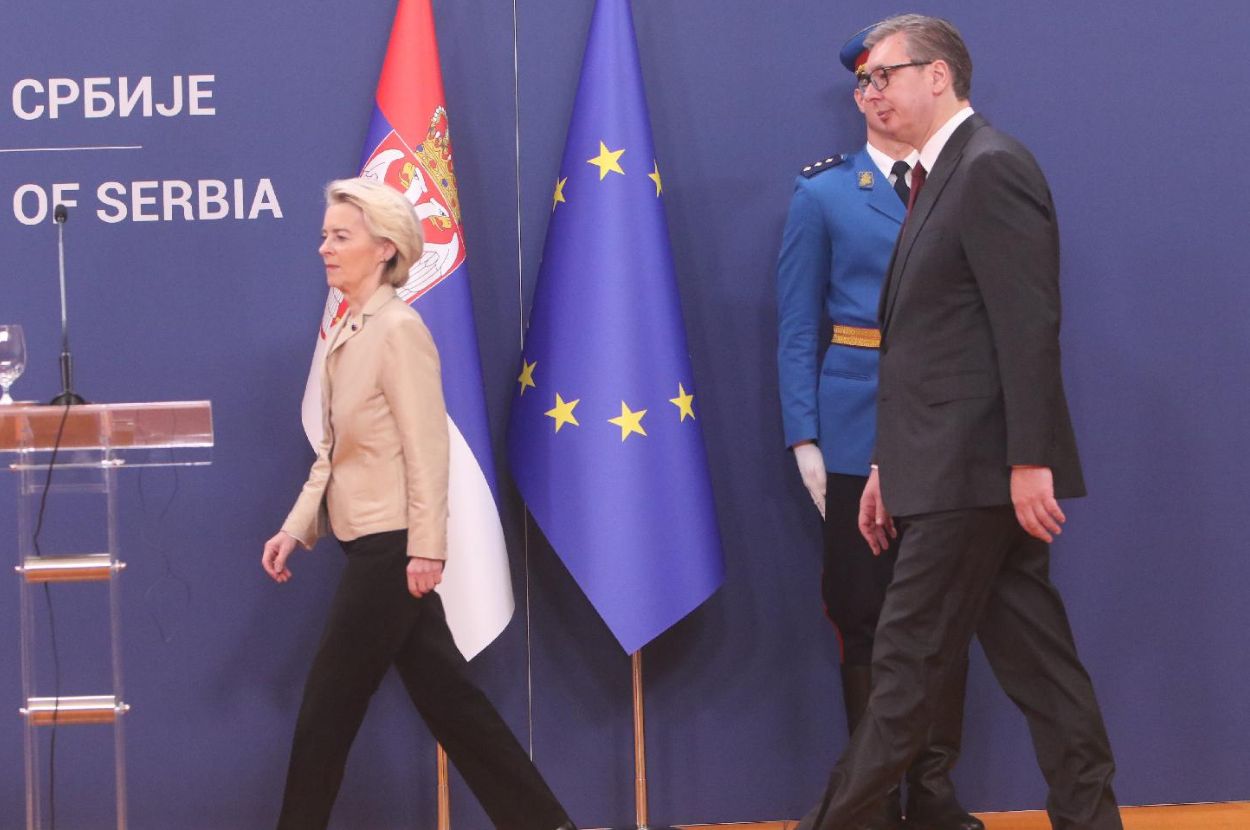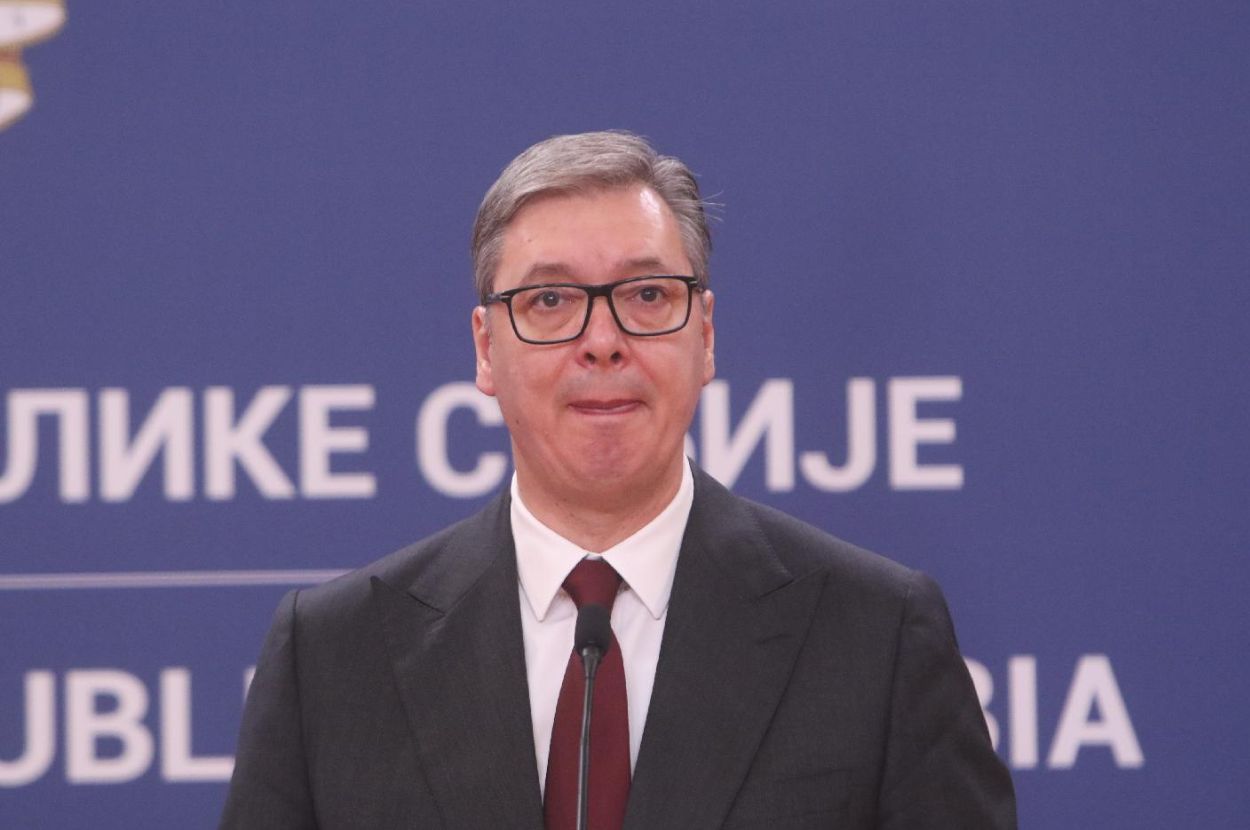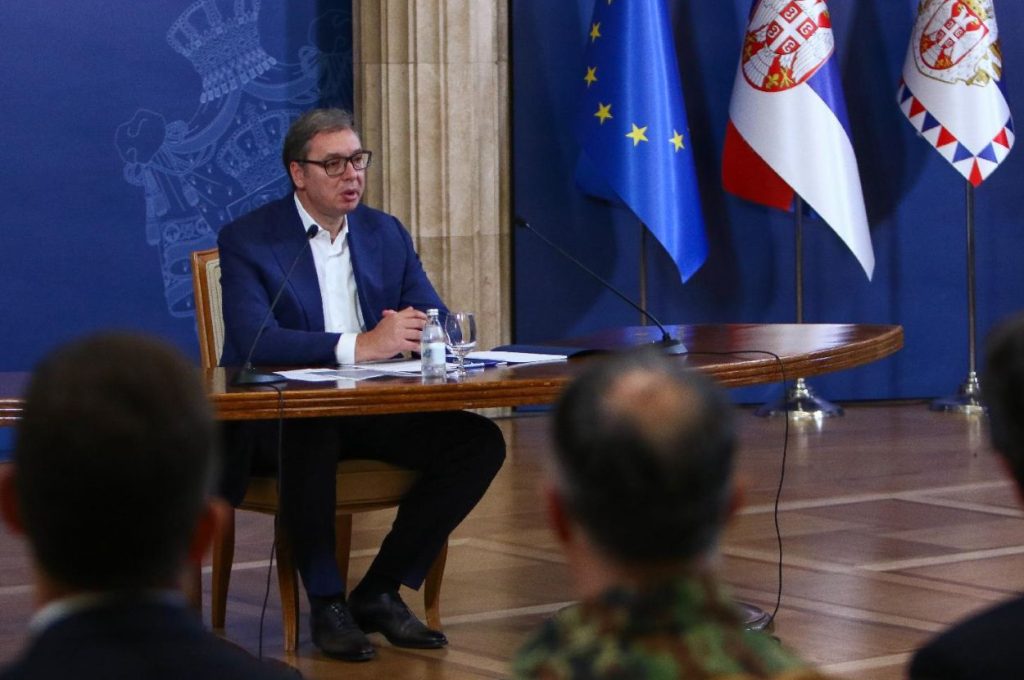Is Vučić Still Comfortable in the “Serbian Chair”?
Serbian President Aleksandar Vučić recently said he was “horrified” by the delivery of Turkish drones to Kosovo. The media also reported that he was “disappointed” to learn that the gas deal with Russia is valid only until the end of the year. Relations between the EU and Vučić’s government are worsening, while Belgrade, by all accounts, isn’t exactly on the list of favorite contacts for the Trump administration either. Experts interviewed by Istinomer say that Serbia is faring poorly both in the East and the West – that the erosion of Vučić’s legitimacy is now visible in foreign policy as well – and that Russia continues to use its main instrument of pressure on Serbia: regional (and EU) destabilization.
During her visit to the Western Balkans, European Commission President Ursula von der Leyen also stopped in Belgrade. On that occasion, Vučić declared: “For Serbia, EU membership is a strategic commitment and a priority of its foreign policy.” Yet the facts tell a different story: Serbia has been stuck on its European path since December 2021, while continuing to nurture ever closer ties with Russia and China.
Foreign policy commentator Boško Jakšić told Istinomer that most of the blame for the stagnation lies squarely in Belgrade: “Foreign policy is in chaos – just like Serbia itself. Not since the wars have our relations with ex-Yugoslav neighbors been this bad. The EU is nominally a geostrategic goal, but the integration process is practically frozen – largely due to the government in Belgrade, which has no intention of carrying out democratic reforms. In four years, only two out of five clusters have been opened. Under the old methodology, 22 out of 35 chapters have been opened, but only two have been closed. Policy alignment stands at a meager 61 percent,” Jakšić says, adding that Serbia is now “paying the price” for failing to align with Brussels on sanctions against Moscow.

“Serbia is being punished with sanctions for not introducing sanctions on Russia – and Moscow is openly signaling that it has no intention of helping its ‘brother in distress.’ The steel industry, the country’s top exporter, is suffering because of Chinese ownership, facing reduced quotas and higher tariffs. Bad in the East, bad in the West,” Jakšić concludes.
Despite all that, Belgrade shows no sign of abandoning its balancing act. Erik Gordy, a Southeast Europe specialist and professor at University College London, reminds us that the Serbian Progressive Party rose to power by “reinventing part of the Serbian Radical Party as a pro-European movement – convincingly enough for Western governments to lift their veto on its participation in power.”
“Since then, Vučić has tried to pursue what he calls a ‘sovereignist’ foreign policy – one that mixes partial cooperation with Europe and partial subordination to Russia, while searching for new partners such as Turkey, China, and the Gulf states,” says Gordy. He adds that Russia “is no longer satisfied with merely symbolic support, while Western audiences increasingly focus on Vučić’s legitimacy problems and see Serbia less and less as a desirable partner.”
The “Serbian Chair” Policy
That so-called “sovereignist” approach is known domestically as the ‘Serbian chair’ policy – invoked by the president whenever he speaks about “traditional friendships” or “national interests,” usually as a response to criticism that he’s trying to “sit on two chairs” between East and West.
“There are no chairs,” Gordy argues. “His legitimacy at home is damaged; Serbia’s chances of EU membership are nil; and although Russia can still threaten Serbia, it no longer has much to offer. What’s left is an open vacuum that smaller, less global powers can exploit – cheaply, because the competition is fading.”
Foreign policy commentator Boško Jakšić draws parallels between Vučić’s “two-chair policy” and former president Boris Tadić’s “four pillars” approach (EU, Russia, the US, and China).
“The ‘round table of knights’ concept designed in Tadić’s time never held much promise – and now it’s completely fallen apart. Both East and West are demanding alignment, while Serbia clings to its archaic non-alignment and military neutrality. Tempi passati. Everything seems to stem from a lack of courage – but behind it lies a camouflage net concealing the government’s Western rhetoric and its real affinity for the autocratic East. The legs of those four chairs are giving way – and it’s high time Serbia made up its mind. As long as this government stays, it won’t happen,” Jakšić concludes.
Moscow Sends a Message
“Another piece of news has come from Moscow,” Vučić said recently. “They offered us a gas contract only until New Year’s. I said it’s disappointing because we expected it to be extended until May, and because we’ve always been a fair and reliable partner in every sense. Why until New Year’s? Because they want to tell us that if we nationalize NIS or make any other move, they can cut off the gas on December 31. That’s a bad message in every way.”
Professor Gordy interprets this as follows: “Putin made it quite clear that he’s aware of Russia’s control over Serbia’s heating gas supply, and that this remains his primary tool of pressure. Initially, he likely wanted to signal that nationalizing NIS would not be tolerated. More broadly, it’s a reminder that Moscow expects greater obedience from Serbia – especially regarding the war in Ukraine.”

Jakšić agrees that energy is the key instrument of Russian diplomacy: “The Serbian market matters little in financial terms – NIS production is just one percent of Gazprom’s output. What matters is political leverage. Keeping Serbia dependent on Russian oil and gas allows, if necessary, the destabilization of the region – and even of the EU. The message from Moscow is tough. Once again, Vučić has relied on the idea of ‘Slavic and Orthodox brotherhood.’ Vladimir Putin has no interest in such sentiments,” Jakšić notes.
The “Horrified” President and Dreams of a “Neo-Ottoman Empire”
Besides being disappointed, President Vučić also said he was “horrified” by the news that Turkish drones had arrived in Kosovo. “It is now completely clear that Turkey doesn’t want stability in the Western Balkans and that it is dreaming again of restoring the Ottoman Empire,” he wrote on X.
“That initial reaction was completely undiplomatic – especially given that Vučić has often praised President Erdoğan as a ‘great friend’ and described Turkish KFOR troops in Kosovo as guarantors of the safety of local Serbs,” says Boško Jakšić. “He later tried to soften his words, but still failed to explain why he was so ‘horrified’ by Turkey’s behavior. Did he expect Ankara to sell drones to Belgrade rather than Pristina? Amateurish. He’s damaged relations that were important for Serbia and had developed despite the Kosovo dispute.”
Professor Gordy adds that Vučić had no issue with Turkish influence in the region when it suited him: “It’s worth noting that Vučić had no problem with Turkey’s growing regional influence while cultivating ties with Turkish banks and firms investing in Serbia. His regime was quite successful in convincing Turkish business leaders that a larger and better-connected Serbian market would be more attractive than those in culturally closer Balkan states. As for Vučić’s imitation of Erdoğan – the less said, the better,” Gordy remarks.
“Aca the Serb” and “Trump the Serb”
Belgrade could barely hide its delight over Donald Trump’s election victory last November. A few days after the vote, Vučić and Trump spoke by phone, after which the Serbian president said: “I expressed hope that he would visit Serbia, because support for his election was the highest here in all of Europe.” Now, however, relations between Belgrade and Washington seem far less warm.
“The compensatory attempt to move closer to the US and away from the EU looked promising at the start of Trump’s second term, when a strategic dialogue was announced. But things went downhill after Vučić tried to enter the Republican convention in Florida last May. In September, his name was missing from the list of 145 world leaders invited to Trump’s UN dinner. Sanctions against NIS were delayed – likely due to Croatia’s Janaf rather than Serbia’s NIS – but were eventually enacted. ‘Trump the Serb’ at his finest,” says Jakšić.
Professor Gordy draws a direct comparison: “Vučić and Trump are united by authoritarianism, corruption, and chauvinism – kindred spirits who recognize one another. But they also share a transactional worldview: people are valuable only insofar as they’re useful. It turns out Vučić is less useful to Trump than he probably hoped,” Gordy observes.
In the end, Istinomer’s interlocutors conclude, Vučić’s true allies are found among autocrats. Both Gordy and Jakšić name those whom Vučić himself – and the tabloids – call his “special friends”: Hungarian Prime Minister Viktor Orbán and Slovak Prime Minister Robert Fico.
“He’s cultivated special ties with Israeli Prime Minister Benjamin Netanyahu, selling him ammunition amid what many describe as genocide in Gaza. He’s grateful to Putin and Xi Jinping for warning him about a supposed ‘color revolution’ in Serbia. He praises Nicolás Maduro. The only thing missing is a warm, neighborly relationship with North Korea’s Kim Jong Un. Vučić’s choice of friends speaks volumes,” Jakšić concludes.
This English translation was generated with the assistance of AI and reviewed for accuracy.

